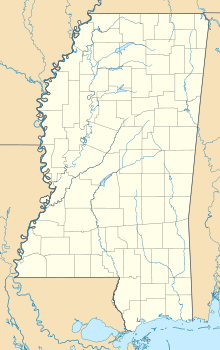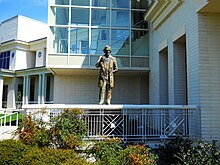
Jefferson F. Davis was an American politician who served as the first and only president of the Confederate States from 1861 to 1865. He represented Mississippi in the United States Senate and the House of Representatives as a member of the Democratic Party before the American Civil War. He was the United States Secretary of War from 1853 to 1857.

Biloxi is a city in Harrison County, Mississippi, United States. It lies on the Gulf Coast in southern Mississippi, bordering the city of Gulfport to its west. The adjacent cities are both designated as seats of Harrison County. The population of Biloxi was 49,449 at the 2020 census, making it the state's 4th most populous city. It is a principal city of the Gulfport–Biloxi metropolitan area, home to 416,259 residents in 2020. The area's first European settlers were French colonists.

Gulfport is the second-most populous city in the U.S. state of Mississippi after the state capital, Jackson. Along with Biloxi, Gulfport is the co-county seat of Harrison County and part of the Gulfport–Biloxi metropolitan area. As of the 2020 census, Gulfport has a population of 72,926; the metro area has a population of 416,259. Gulfport lies along the gulf coast of the United States in southern Mississippi, taking its name from its port on the Gulf Coast on the Mississippi Sound. It is home to the U.S. Navy Atlantic Fleet Seabees.

The Beauvoir estate, built in Biloxi, Mississippi, along the Gulf of Mexico, was the post-war home (1876–1889) of the former President of the Confederate States of America Jefferson Davis. The National Park Service designated the house and plantation as a National Historic Landmark.

Varina Anne Banks Davis was the only First Lady of the Confederate States of America, and the longtime second wife of President Jefferson Davis. She moved to the presidential mansion in Richmond, Virginia, in mid-1861, and lived there for the remainder of the Civil War. Born and raised in the Southern United States and educated in Philadelphia, she had family on both sides of the conflict and unconventional views for a woman in her public role. She did not support the Confederacy's position on slavery, and was ambivalent about the war.

In the United States, the presidential library system is a nationwide network of 16 libraries administered by the Office of Presidential Libraries, which is part of the National Archives and Records Administration (NARA). These are repositories for preserving and making available the papers, records, collections and other historical materials of every president of the United States since Herbert Hoover, the 31st president from 1929–1933. In addition to the library services, museum exhibitions concerning the presidency are displayed.
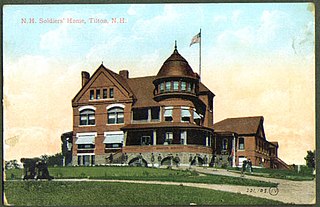
An old soldiers' home is a military veterans' retirement home, nursing home, or hospital, or sometimes an institution for the care of the widows and orphans of a nation's soldiers, sailors, and marines, etc.
Jefferson Davis (1808–1889), President of the Confederate States from 1861 to 1865.

The Tomb of the Unknown Confederate Soldier is a tomb on the grounds of Beauvoir in Biloxi, Mississippi, that holds the remains of an unidentified Confederate soldier of the American Civil War.
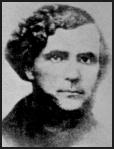
Richard Griffith was a brigadier general in the Confederate States Army during the American Civil War. He was mortally wounded at the Battle of Savage's Station during the 1862 Peninsula Campaign. He was one of a number of Confederate generals who were born in the North in Pennsylvania.
Jim Limber was an American orphaned boy of mixed white and black descent who lived with the family of Confederate president Jefferson Davis from February 1864 until the family was captured by Union forces in May 1865.
A Mississippi Landmark is a building officially nominated by the Mississippi Department of Archives and History and approved by each county's chancery clerk. The Mississippi Landmark designation is the highest form of recognition bestowed on properties by the state of Mississippi, and designated properties are protected from changes that may alter the property's historic character. Currently there are 890 designated landmarks in the state. Mississippi Landmarks are spread out between eighty-one of Mississippi's eighty-two counties; only Issaquena County has no such landmarks.

Brierfield Plantation was a large forced-labor cotton farm built in 1847 in Davis Bend, Mississippi, south of Vicksburg, and the home of Confederate President Jefferson Davis.
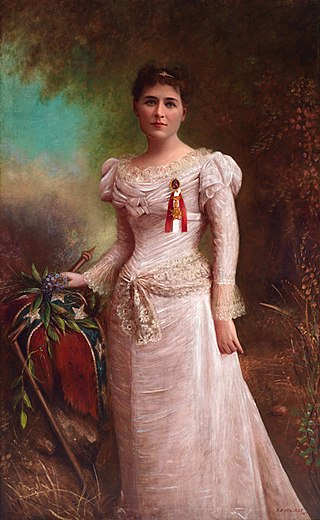
Varina Anne "Winnie" Davis was an American author who is best known as the youngest daughter of President Jefferson Davis of the Confederate States of America and Varina (Howell) Davis. Born near the end of the war, by the late 1880s she became known as the "Daughter of the Confederacy". Images of her were widely circulated when she was young, helping morale. Later in the 1880s, she appeared with her father on behalf of Confederate veterans' groups. After his death, she and her mother moved in 1891 to New York City, where they both worked as writers. She published a biography and two novels, in addition to numerous articles. Davis died from an infectious disease at age 34.
Mississippi City is an unincorporated community in Harrison County, Mississippi, United States. It is part of the Gulfport–Biloxi, Mississippi Metropolitan Statistical Area. The community was annexed by Gulfport, Mississippi in 1965.
A presidential library, presidential center, or presidential museum is a facility either created in honor of a former president and containing their papers, or affiliated with a country's presidency.

Eliza Jane Van Benthuysen Davis was an American planter, letter writer, and the châtelaine of Hurricane Plantation. She was married to Joseph Emory Davis, the older brother of Confederate President Jefferson Davis.

